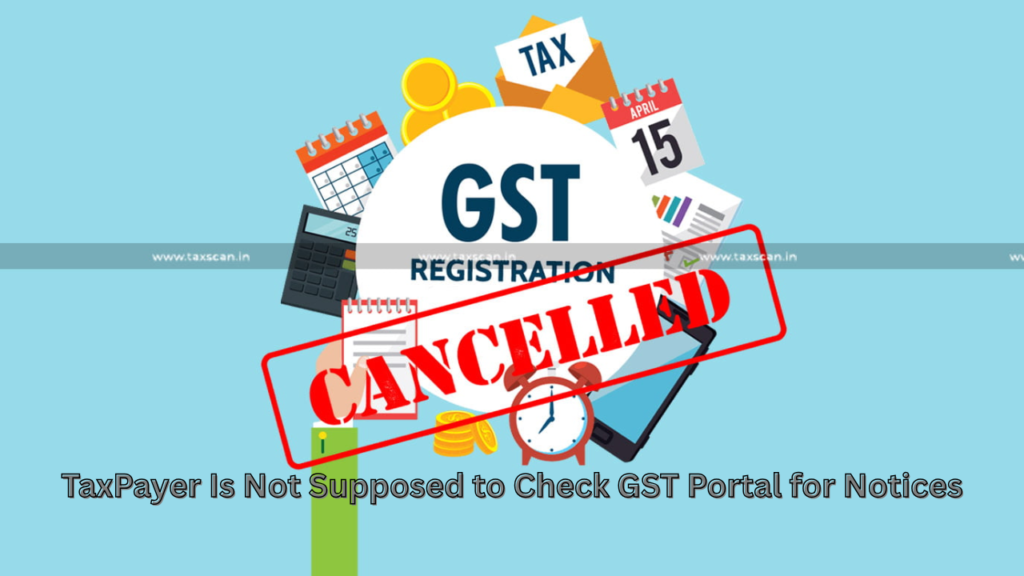
Facts of the Case
- GST Registration Cancelled:
- The petitioner’s GST registration was cancelled on 19 October 2020.
- After cancellation, the petitioner did not conduct any business.
- Show Cause Notice:
- A notice was issued by the tax department, but it was only uploaded on the GST portal.
- The petitioner claimed that since his registration was already cancelled, he was not required to keep checking the GST portal.
- Orders Passed:
- Despite cancellation, the Assistant Commissioner (State Tax, Ghaziabad) passed orders dated 23 April 2024 and 19 June 2025, raising demands under Section 73 and initiating recovery under Section 79(1)(c).
⚖️ Court’s Reasoning
- Duty to Check Portal:
- Once a taxpayer’s GST registration is cancelled, he is no longer required to monitor the GST portal for notices.
- The department should have served notices through alternative means (such as physical delivery, email, or other proper service methods).
- Principle of Natural Justice Violated:
- By only uploading the notice on the portal (without ensuring actual communication), the petitioner was deprived of an opportunity to respond.
- This goes against the principle of natural justice (every party should get a fair chance to be heard).
- Precedent Relied Upon:
- The Court relied on its earlier ruling in M/s Katyal Industries v. State of U.P. where it was held that service of notices only on the portal is not sufficient when registration is cancelled.
🏛️ Court’s Decision
- The impugned orders dated 23.04.2024 and 19.06.2025 were quashed and set aside.
- However, the department was given liberty to issue fresh notices properly and then proceed according to law.
- The writ petition was thus disposed of with this direction.
Case Background
- Petitioner (Applicant): Sr Interiors
- Respondents: State of U.P. & others
- Court: Allahabad High Court
- Judges: Justice Shekhar B. Saraf & Justice Praveen Kumar Giri
- Date: 9 September 2025
- Issue: The petitioner challenged GST demand and recovery orders under Section 73 & others (tax not paid/short paid) and Section 79(1)(c) (recovery of tax) of the UP GST Act, 2017.
🔑 Crux (in simple words)
- If a taxpayer’s GST registration is cancelled, the tax department cannot expect him to keep checking the GST portal.
- Notices must be served in a proper and effective manner.
- Uploading notices only on the portal after cancellation is a defective service of notice.
- Since natural justice was violated, the Court struck down the demand and recovery orders.
- The department, however, is free to start proceedings again — but only after serving notice properly.
👉 In short: The Court protected the taxpayer’s right to fair hearing and reminded the GST department that cancellation of registration changes how notices should be served.
Practical Takeaways from the Judgment
✅ For Taxpayers
- After GST cancellation, you don’t need to monitor the GST portal:
- If your registration is cancelled, you are not under obligation to check notices uploaded on the portal.
- If the department wants to proceed against you, they must serve you through other valid means.
- Always keep your contact details updated:
- Even if registration is cancelled, make sure your email, phone, and address in the GST records are correct.
- This way, if any notice is served by alternate methods, you’ll receive it.
- Use the “natural justice” argument:
- If an order is passed without you actually receiving the notice, you can challenge it by citing violation of natural justice.
- But stay alert:
- Though you aren’t legally required to check the portal post-cancellation, it’s still wise to occasionally check it, especially if you are dealing with pending tax matters.
✅ For GST Officers
- Don’t rely only on portal uploads when registration is cancelled:
- Service of notice must be meaningful.
- Uploading on the portal is not enough — officers should also serve by post, email, or physical delivery.
- Follow principles of natural justice:
- Ensure that the taxpayer has a fair chance to reply.
- Orders passed without effective notice are at risk of being struck down by courts.
- Learn from precedents:
- Courts (including this one in M/s Katyal Industries and now Sr Interiors) have consistently held that portal-only service is not valid after cancellation.
- Proceed afresh if set aside:
- When such orders are quashed, officers still have the liberty to issue a fresh notice properly and continue the proceedings lawfully.
⚖️ Broader Impact of the Case
- This case strengthens taxpayer rights under GST by ensuring that cancelled taxpayers are not unfairly burdened with portal-only notices.
- It also guides the tax administration to improve service methods and avoid technical-only communication.
- The ruling balances fairness: it protects the taxpayer but still allows the department to recover dues — provided they follow proper legal procedure.
👉 Bottom line:
The judgment is a reminder that “procedure is the backbone of justice”. Even if the department is right on tax, if they fail in proper service of notice, their orders won’t stand.